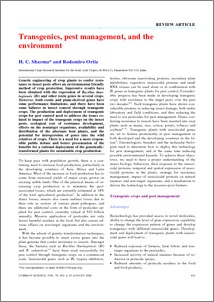Transgenics, pest management, and the environment
Abstract
Genetic engineering of crop plants to confer resistance to insect pests offers an environmental friendly method of crop protection. Impressive results have been obtained with the expression of Bacillus thuringiensis (Bt) and other toxin genes in several crops. However, both exotic and plant-derived genes have some performance limitations, and there have been some failures in insect control through transgenic crops. The production and deployment of transgenic crops for pest control need to address the issues related to impact of the transgenic crops on the insect pests, ecological cost of resistance development, effects on the nontarget organisms, availability and distribution of the alternate host plants, and the potential for introgression of genes into the wild relatives of crops. There is a need for a more responsible public debate and better presentation of the benefits for a rational deployment of the geneticallytransformed plants for sustainable crop production

